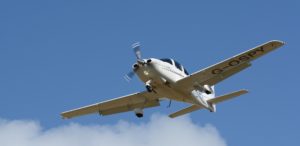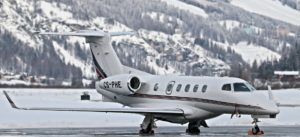The collaborative model has become essential over the last 5 years. Many sectors have seen the emergence of new sharing concepts based on the Uber model. Business aviation is no exception! For several years now, new players in aviation have been trying to revolutionize the sector by offering dazzling flight-sharing offers: Uber for private jets. AEROAFFAIRES explains how this new model works and what it means for travelling in complete safety.
What is Flight Sharing?
Uber for private jets
The concept of flight sharing is simple: a non-professional pilot plans a flight on a light aircraft and sells the empty seats through a dedicated platform, for a shared trip. Some start-ups have been offering this Uber for private jets service since 2015.
Initially, in France, flight sharing is allowed and has been practiced since the beginnings of tourist aviation. According to the European Commission, a PPL (Private Pilot License) licensed pilot has the right to carry passengers on-board his aircraft if he shares the cost of the flight with all people on-board. If a passenger does not share the costs, this is considered to be illegal commercial transport of passengers. The regulation limits the number of passengers to 6 in this very specific framework. In reality, this rule is only applicable if the people on-board are known to the pilot, meanwhile the new flight-sharing platforms bring together people who do not know each other beforehand and therefore play with the regulations to make them evolve.
Flight Sharing as a source of concern
The Directorate General of Civil Aviation (DGAC), after having expressed its concern about the development of flight-sharing platforms, has finally decided to permit the practice. In January 2020, the French Aeronautical Federation (FFA) decided that flight sharing should be called extended cost-sharing flights and should only be offered by aeroclubs and platforms affiliated with the FFA. The Federation permits it by recognising its role in the development and democratisation of tourist aviation. According to them, 148 French aeroclubs authorised extended cost-sharing flights in 2019, covering 2,535 flight hours with 3,647 passengers carried. About 400,000€ were injected in these aeroclubs thanks to flight sharing.
The FFA nevertheless lays out safeguards. Each aeroclub must outline its own criteria for extended cost-sharing flights. In addition, a specific group of pilots permitted to carry out extended cost-sharing flights must be set up by the aeroclubs’ presidents. Lastly, the price for boarding these flights must not exceed the total cost of the flight; it must remain cost-sharing only, Uber for private jets.
Now, flight-sharing practice is developing across Europe, but not all these platforms have positioned themselves in the same field. Some specialise in tourist flights where pilots essentially offer sightseeing flights with the same departure and arrival point. Others specialise in tourism transport to new destinations. It is the latter that have the scope to compete with business and commercial aviation.

Flight-sharing versus business aviation
The Uber of private jets seems the ideal challenge to business aviation as it allows pilots to reduce costs and passengers to travel at very competitive prices. Nevertheless, it is still in the grey area between private aviation and commercial transport and it raises many issues relating to safety, insurance issues and unfair competition.
-
Non-professional pilots
Extended cost-sharing flights are flown by non-professional private pilots. They are qualified to carry passengers they know on a free light flight. But they do not have the qualifications and training to charge to carry passengers they do not know. The paid transport of strangers puts pressure on the pilot in terms of schedules, flight conditions and cancellation due to bad weather.
Also, the requirements for pilots are lower in terms of skills, experience and medical fitness. This significantly increases the risk of an in-flight incident. Business aviation, on the other hand, has to meet with much stricter conditions. A minimum of two pilots is required and they must have all the qualifications required for commercial transport. These pilots also have Instrument Flying Rules (IFR) ratings that allow them to fly by instrument, particularly in poor weather conditions while non-commercial pilots are mostly not qualified to fly under these rules.
-
Poorly adapted light aircraft
The aircraft used in the flight sharing model are often single-engine aircraft. They are flown by a single pilot, have narrow cabins and a very limited range.
In business aviation, the rule is simple: two pilots, two engines. All aircraft types must be twin-engined (except a turboprop like the Pilatus PC-12 and the TBM 850 since 2017) so one engine is available in case of failure. In addition, the airlines operating these private jets have an Air Operator’s Certificate (AOC); fundamental to guarantee a high level of aircraft maintenance and strict monitoring of pilot qualifications. However, neither amateur pilots nor flying clubs have an AOC to prove they comply with the best transport conditions for passengers.
Moreover, the light aircraft offered on these collaborative platforms are rather slow, with narrow cabins, few seats and limited range meaning they are not suitable at all for business aviation. Business private jets are specially adapted for it. Their cabins specially designed for business travel and they are able to fly at night, in poor weather conditions and to make difficult approaches in isolated areas.
-
A lack of insurance
A significant insurance risk exists in the context of Uber for private jets. For passengers and aircraft owners alike.
In France, the pilot’s liability in the case of a free transport (flight-sharing) can only be engaged for proven fault, with a ceiling of €114,336 per passenger and that “only the inexcusable fault of the carrier allows this ceiling to be waived and full compensation to be awarded.”
In the case of a paid flight under public transport conditions, liability may be incurred for presumed (and not proven) fault with a ceiling of €140,000 per passenger. The carrier will have to prove that it was not at fault or that the accident was caused by a third party in order to be exempted from full compensation. Passengers who use flight-sharing platforms are therefore much less protected than if they had flown within the legal framework of business aviation.
Aircraft owners (individual legal entities or aeroclubs) also put themselves at risk by offering their aircraft for this type of flight. Their liability, particularly criminal liability, can be invoked in the event of an accident.
Finally, flight sharing is on the limits of commercial aviation. In the event of an accident, it is up to the judge to requalify a cost-sharing flight as illegal public passenger transport. The carrier is liable to a penalty of up to 1-year imprisonment and a fine of €75,000 under French law.
Companies that regularly use private jets for business travel cannot afford to turn to flight sharing. The insurance risk is too significant as companies need to transport their employees in the safest possible conditions that protect their staff and their reputation.
-
The risk of transporting fraudulent goods
Collaborative air travel does not meet public transport regulations. Aircraft are therefore exempt from customs controls and checks by the European Aviation Safety Agency (EASA). All these flights may open the door to discreet narcotics transport, without the pilot’s knowledge.

Flight-sharing does not meet the requirements of business aviation
Flight-sharing does not really meet the needs of businesses and business travellers. Business and VIP travellers need customized solutions (like a concierge) that fit perfectly with their company’s business travel policies. Moreover, the light aircraft offered on these flight-sharing platforms are not suitable for transporting businesspeople or high-net-worth travellers.
Finally, the risk of accidents is higher than in public transport and the insurance coverage is insufficient to protect companies and employees. The accidents that unfortunately recur in tourist aviation are a reminder of the need to turn to competent and insured professionals for business travel.
Flight sharing can be a low-cost solution for short flights but not for a VIP or business trip. The best way to fly safely and in the best conditions is still to contact a specialist air broker such as AEROAFFAIRES. We are committed to finding the best solutions for your requirements.
Examples of estimated prices for private jet rentals:
– Paris – Deauville for 4 passengers or fewer, from 4,200 € ex-VAT
– From Paris to Arcachon for 4 passengers or fewer, from 7,100 € ex-VAT
– Paris – Biarritz for 4 passengers or fewer, from 7,800 € ex-VAT
Request a price quotation now by filing our online quote form.
The AEROAFFAIRES team can be reached 24/7 by phone at +33 (0)1 44 09 91 82 or by email at info@aeroaffaires.com.


